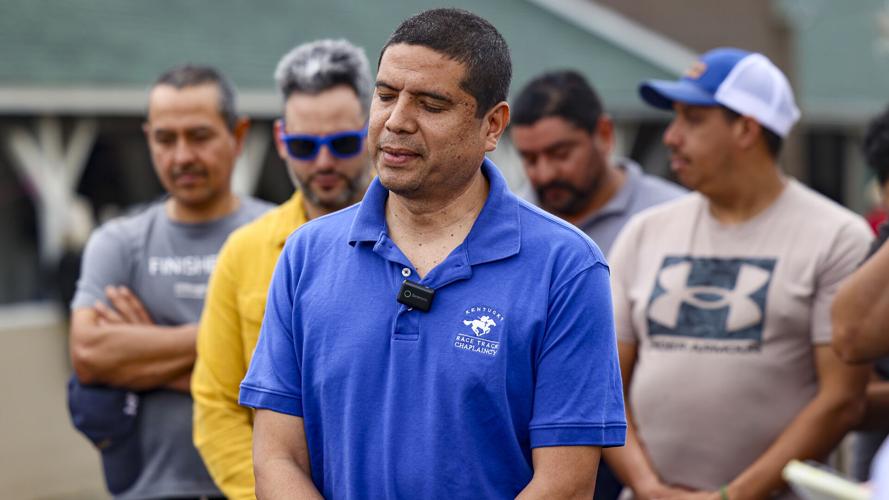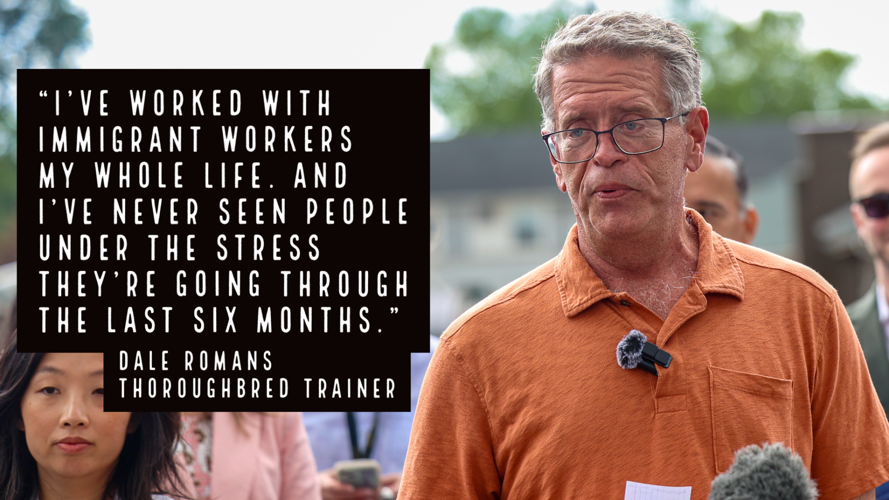LOUISVILLE, Ky. (WDRB) -- Trainer Dale Romans was preparing to send a trailer of horses north from Florida to Kentucky — like he does every year — when some of the workers set to ride with them pulled him aside.
They were scared. Because the van would have to go through weigh stations, Romans said they asked him "Are we going to be taken off and swept away when we cross the border? Is ICE going to be sitting there waiting?"
These workers had visas. They were here legally. Some had made these trips before. But that did not alleviate their fears.
"I've worked with immigrant workers my whole life," Romans said. "And I've never seen people under the stress they're going through the last six months. Everybody's worried. Even if they're good people, they're still worried about what could happen. I've never had as many coming to ask me questions."
That stress — quiet but constant — lives beneath the pageantry of the Kentucky Derby this week. It's felt by the workers who bathe the horses, clean the stalls and walk the shedrows before most of Louisville is awake. Many are immigrants. Many are on legal visas. All are watching the news and wondering what might happen next.
On Thursday morning, with the Twin Spires in view, Romans and a group of horsemen, business leaders and immigration advocates gathered at Barn 4 at Churchill Downs to talk about it. The discussion was remarkable in its clear effort not to stir controversy. There was no criticism of President Donald Trump. They simply wanted to explain what's happening — and why they believe immigration reform is overdue — not just for their workers but for the industry itself.
This fact cannot be open to debate: Without immigrant workers, there would be no racing Saturday. In fact, there would be no racing at all.
"If we couldn't have an immigrant workforce on the backside, I don't know how horse racing exists," Romans said.
According to Rebecca Shi, CEO of the American Business Immigration Coalition, about 78% of backstretch workers in racing are immigrants. More than 70% of jockeys are Latino or immigrant.
And while many are here legally, the system they rely on is anything but stable.

Eric Hamelback, CEO of the National Horsemen's Benevolent and Protective Association, called the current H-2B visa process "cumbersome" and unreliable. It only allows for 10-month stays. It's capped annually. And there's no guarantee of renewal.
Romans put it more bluntly: "There's a cap on visas but there's not a cap on need."
The ask from this group isn't for blanket amnesty. The proposal, supported by a bipartisan coalition of business leaders, would create a legal pathway for long-serving workers in industries like horse racing and farming. It mirrors legislation that nearly passed in 2023 — offering a work permit to those who have been employed in agriculture and commit to staying in the sector.
"We need a common-sense path to long term legalization," Romans said. "We're not talking citizenship, but just some kind of work permit. In the perfect scenario, we get an amnesty program that leads to a work permit that if you go through and you're vetted, you've proven not to be a criminal, that you'll pay your taxes, that you have an employer sponsor you, so that you have the right to work in the United States. That's all we're asking for."
Immigration attorney William Velie, who has represented horsemen around the country, said the bill that would have achieved much of that in 2023 fell just short.
"The lifeblood of this industry is immigrant labor," Velie said. "They come here and they work in the industry because they love the industry, and we need to make sure to take care of them.
They're trying to move the conversation forward. The hope is that with heightened attention to workforce shortages — and recent talk in Washington about pairing border security with worker protections — the timing may finally be right.
"We need to both secure the border and secure America's workforce," Shi said. "President Trump has said that the border is 99.4% secure. ... Now is the time. We're eager to partner with the equine industry, with President Trump, to finally get this over the finish line, creating a legal and sustainable workforce for our agriculture and equine industries."
The event ended not with policy proposals, but with a prayer. Pavel Urrichi, chaplain for the Kentucky Racetrack Chaplaincy, gathered with workers and bowed his head.
"I pray Lord that your presence will be with everybody that goes to the races, with the jockeys, with the horsemen, everybody involved," Urrichi prayed. "May you keep this track safe, and may we do everything to honor you."
The Derby, as always, will celebrate the beauty of the sport — the horses, the speed, the spectacle. But behind it all are the workers who make it go and whose futures remain uncertain.
They're not looking for recognition. They just want to keep working — and sleep a little easier on the ride to the next track.
Kentucky Derby Coverage:
BOZICH | Crushing the Kentucky Derby trifecta, superfecta, high five with Joe Montano
Kentucky Derby betting 101 | Learning the track lingo for exacta, trifecta and exotics
BOZICH | Picking the Derby winner with Travis Stone, Dale Romans, Mark Casse, Jack Wolf
Copyright 2025 WDRB Media. All Rights Reserved.














